|
敬请期待中文版 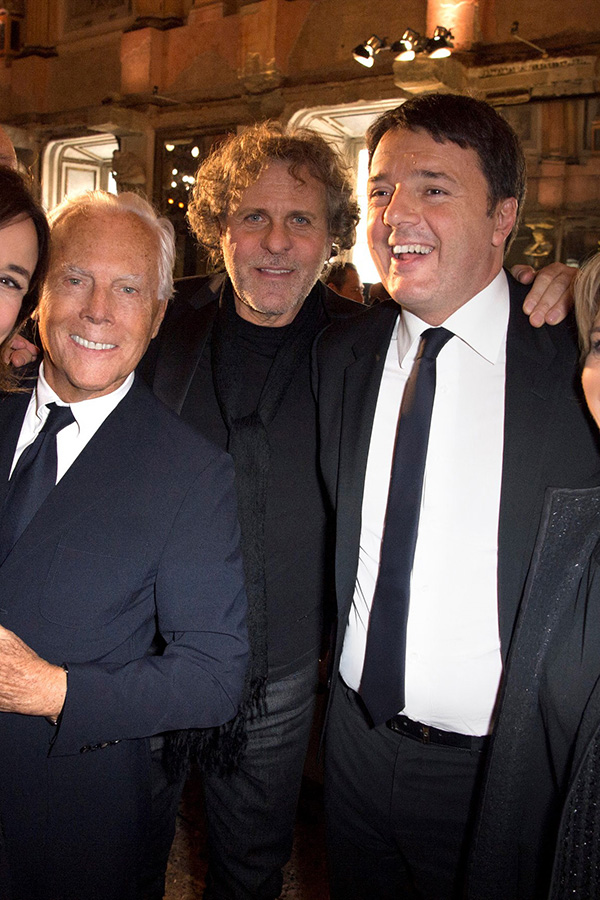 Giorgio Armani, Renzo Rosso and Matteo Renzi Picture credit: @SuzyMenkesVogue WHEN A FASHION week is opened by a prime minister with an army of designers and executives in attendance, you know that something has changed in Italy. The country that only brought its individualist nation states together just over a century ago and whose fashion universe has remained fragmented and argumentative, met together over lunch to kick off Milan Fashion Week. The fact that the Italian head of state, Prime Minister Matteo Renzi, hosted the event would be inconceivable in most western countries. If the UK's David Cameron had paused his efforts to keep his country in the European Union to support London fashion he would have been torn to shreds in the British papers. Barack Obama cheering on New York style? I don't think so. 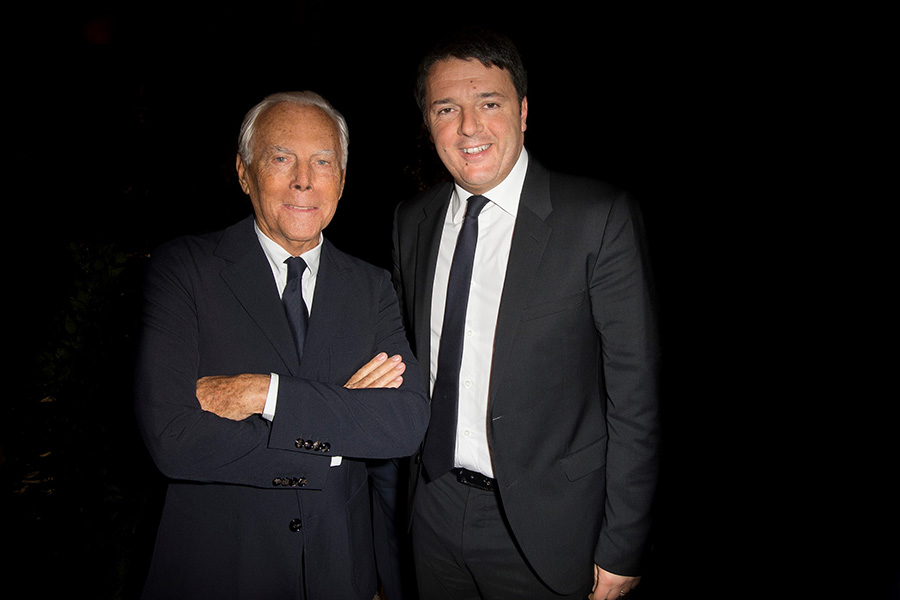 Giorgio Armani and Matteo Renzi Picture credit: @SuzyMenkesVogue But there was a reason why the Italian Prime Minister and Milan's Mayor Giuliano Pisapia had supported Carlo Capasa, the head of Italian fashion's governing body, Camera Nazionale della Moda Italiana. Italy is the only country in the world that has maintained a production of both artisanship and design. In other words, it both creates the idea and makes the garment. And however inventive international designers are, it is Italian workmanship that makes high fashion happen. This exceptional position is understood by Renzi, who, at 41 is young enough to understand the importance of encouraging a new generation into designing and creating clothes. The bottom line is the entire business of Italian fashion - not the dramatic gesture of getting Giorgio Armani and Donatella Versace into the same picture. 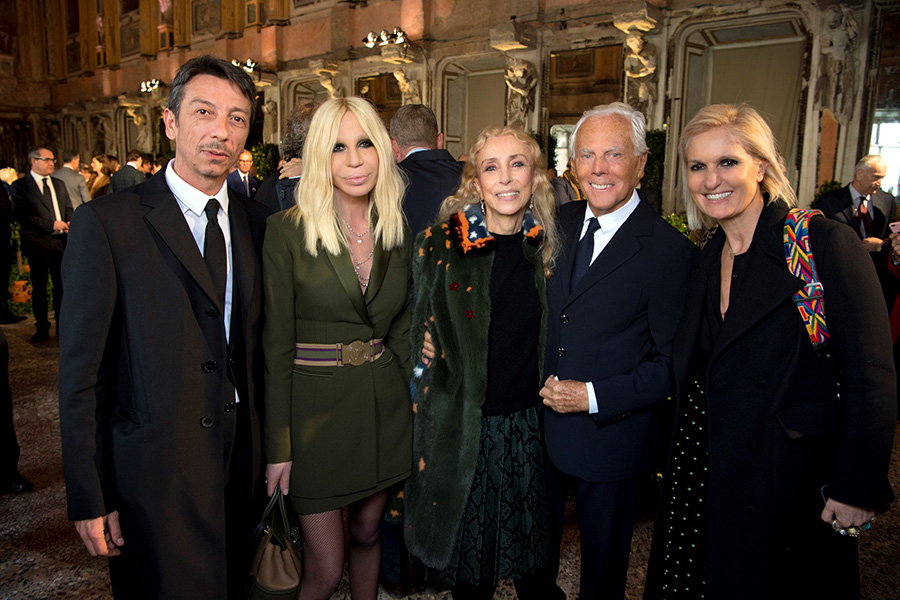 Pierpaolo Piccioli, Donatella Versace, Franca Sozzani, Giorgio Armani, Maria Grazia Chiuri Picture credit: @SuzyMenkesVogue The Prime Minister is determined that Italy in general should not be a museum, but should use its glorious past to project forward into the future. His presence in Milan was not just a compliment, but a challenge. Can there be a recharging of the fashion dynamism of 40 years ago - when many of those designers, like Armani, founded their mighty empires? Renzi was positive, saying: "the fashion industry is teaching us what the future of Italy should be like; not a country that lingers on nostalgia - however emotional and beautiful this feeling may be - but a country that feeds on curiosity, much more of a workshop than a museum; much more innovative than conservative." "This is exactly what Italy needs now and fashion is a forerunner." Gucci: Visual Effects of Vintage The most dramatic fashion rebirth is the renaissance of Gucci, where Creative Director Alessandro Michele, a former assistant working previously under the radar at the house, has transformed the image of the brand and, according to the latest financial figures, has put four per cent on lacklustre figures. 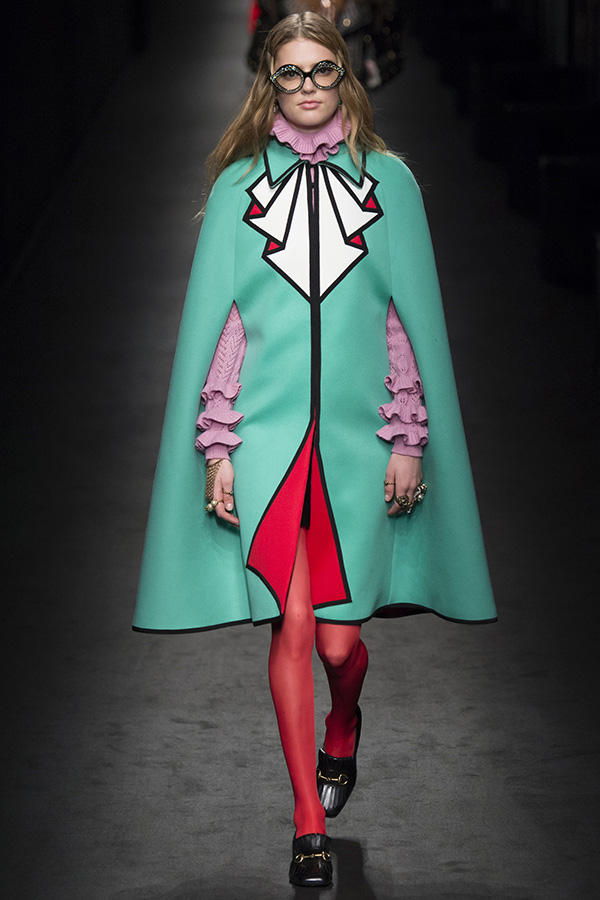 Picture credit: Indigital If you believe that there is no future without a past - that is the policy of Michele, who juices up emblematic pieces from the 1970s, when Gucci had embraced the glamorous jet set. There were no Gucci clothes before that point - only glam bags and shoes. But the designer has used his sharp eye to re-evaluate vintage as a kind of fashion virtual reality. The shock of these rag-bag clothes, made luxurious, came last season. For Autumn/Winter 2016-17, the look seemed even more frenetically fragmented, shown behind a semi-transparent screen with flashing lights. First and foremost there was colour: a shocking pink fur coat, a turquoise cape, a striking red trouser suit and so on with the wildness of a painter let loose on the canvas. 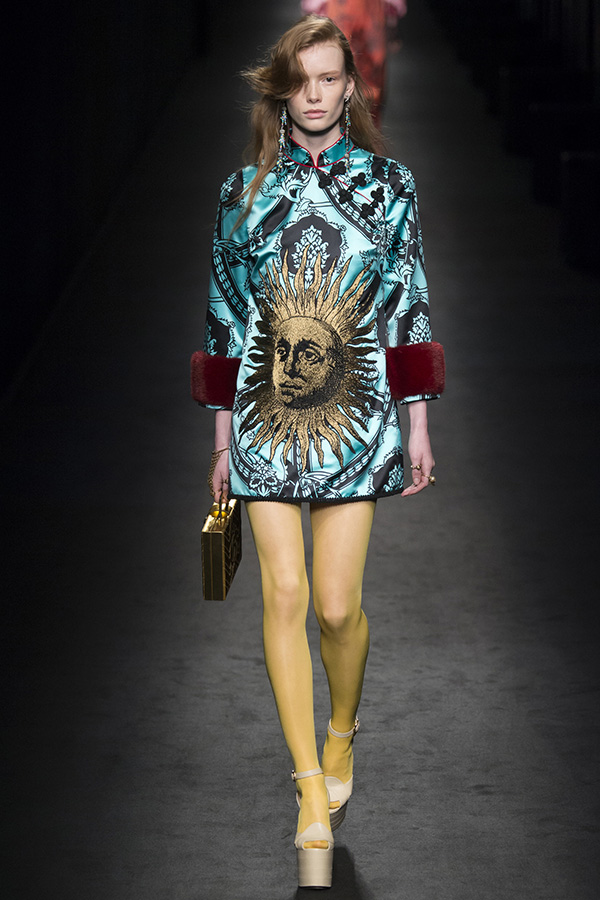 Picture credit: Indigital And that was not all! There were animals - bears, monkeys and snakes created with different techniques from knit to appliqué across bodices. There were eclectic patterns, a vast twin "G" for Gucci on a jacket back, or a Renaissance sun bursting at the stomach. There were also hats, belts and, of course, the crucial bags and shoes. Since many of these items appeared together on one outfit, the sensual overload was dizzying. But the logic of this wild whirl, as if a vintage store had been created with computer generated visual effects, was to offer an enormous amount of products to be plucked from each of the 70 outfits.  Picture credit: Indigital The show cannot really be judged until accessories are taken away from the clothes and seen separately. But the energy alone could be hyper effective, at a time when the western world seems weary of fashion - and when a new generation is so eager to see and click. I asked François Pinault if he was excited by the apparent rising success of Gucci. The executive showed caution. "Let's wait and see!" he said. Roberto Cavalli: Re-birth of the New After a first season flop, Peter Dundas came up with a good, strong collection for Roberto Cavalli. Now that the founder of the house is out of the picture, the current Creative Director may have referenced the past, but new life was put into the familiar. 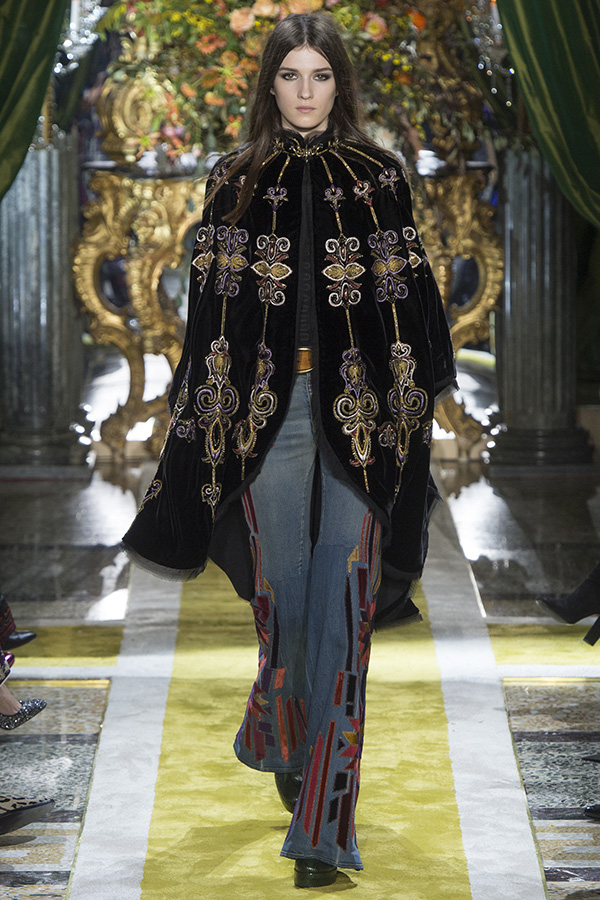 Picture credit: Indigital It all started with the chandeliers, vast objects of past glamour but dangling over the show with a modern, silvered effect. That contrasted with gilded furnishings and palm trees, which all expressed a vaguely decadent fin de siècle. But however much he was referencing the world-weary culture of pre-modernism - all shades of purple, intense decoration and slouchy, lavish furs - the Cavalli look never got out of control. The starting point may have been Edwardian serpents, but they got mixed up with Janis Joplin. For every decadent historical figure or dense drawing by Aubrey Beardsley as Dundas reference points, there were women striding the runway in skinny jeans under sweeping capes and coats.  Picture credit: Indigital "The fusion of Belle Époque with rock is the root of the collection," explained the designer. But, to put words in his mouth, he could have said instead: the legacy of craftsmanship in embellishment at Cavalli is the seed of the house. Italian craftsmanship has its own legacy, going back at least to the Renaissance, to Papal robes and to the costumising of the Catholic church. There may be nothing religious - rather the opposite - in a velvet jacket, rich in gilded embroidery worn with sexy denim pants; or in lace used to expose the body rather than shield the face. But the skills that created these materials could be traced back centuries. 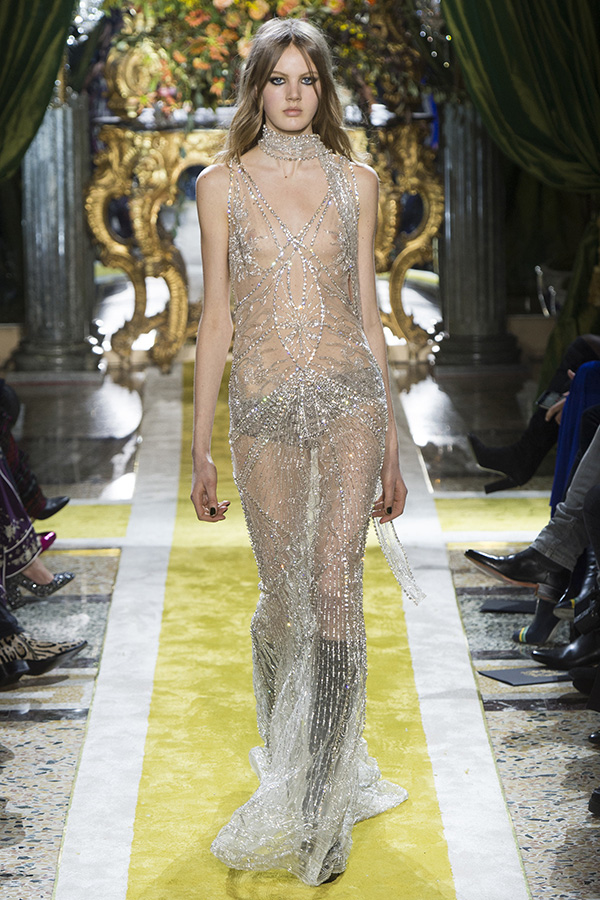 Picture credit: Indigital Thinking back, Dundas probably saw his first show as a palette-cleaning exercise. It is good news for fashion that he has re-immersed himself in Italian heritage - in a modern way. Alberta Ferretti: Spring Time Alberta Ferretti is old school, which is a compliment, meaning that she has all the values that have made Italian fashion so important. 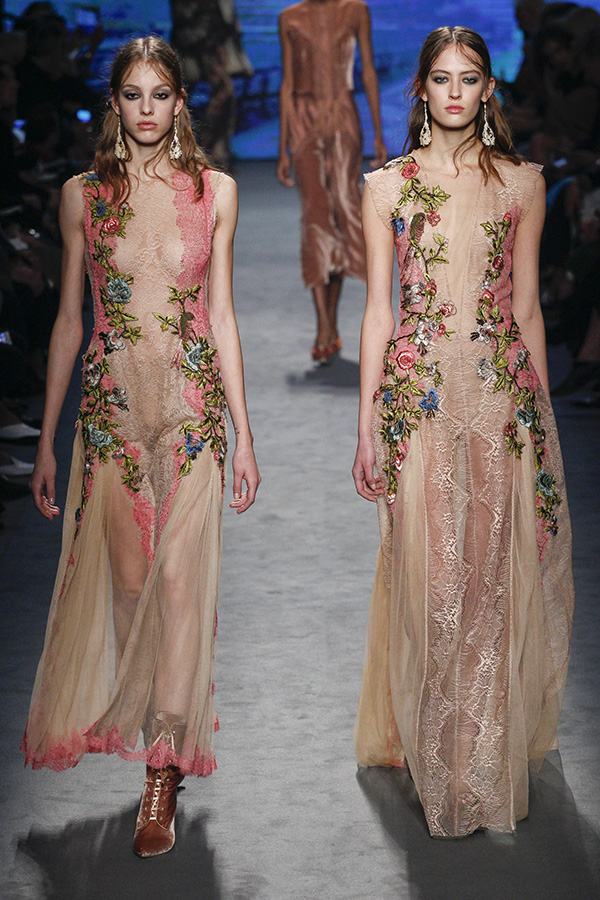 Picture credit: Indigital First and foremost: a treatment of technique with an exceptionally light touch. Almost every Ferretti outfit is intensely, but prettily decorated. And when a dress comes out from neck to ankles without embellishment, it is all the better to show the sheen of ginger satin, certainly made in Italy. This season's show emphasised the delicacy by running a backdrop of winter images, the bare branches of the trees reflecting the lace dresses, which might be short and perky, as much as long and luscious. 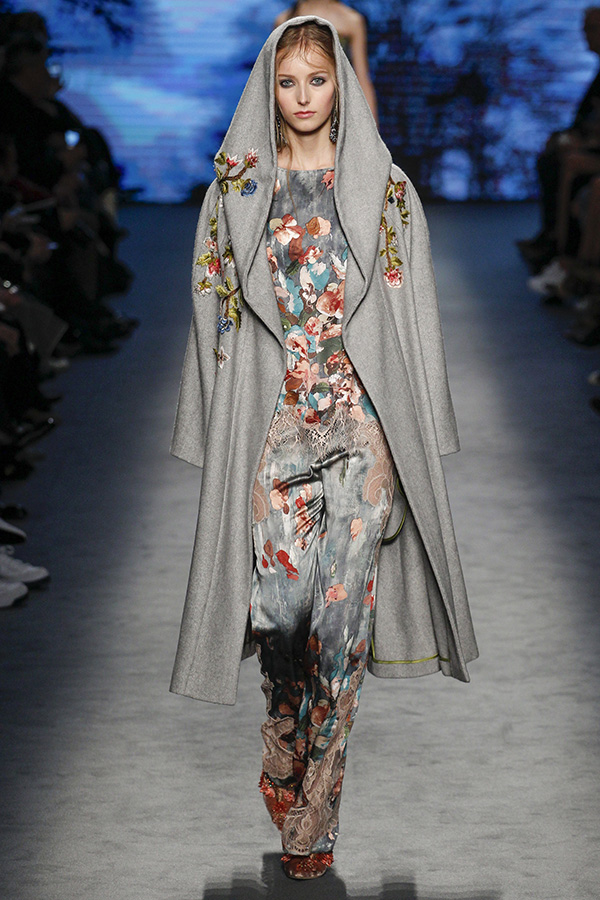 Picture credit: Indigital Ferretti has recently been shying away from the red-carpet awards season, except for famous clients who appreciate the gentility of her work. So perhaps that is why this season she took a languid look at nightwear - silken outfits that seemed like a 21st-century version of palazzo pyjamas. Or simple garments that might have been top-of-the-line nightwear.  Picture credit: Indigital I prefer Ferretti at her most womanly. A lace top segueing into a fur skirt was beautiful in its apparent simplicity; and a dress embroidered with flowers that looked like they were poking through from winter's barren land. That dress was Italian to its roots: elegance, craftsmanship, a sense of re-birth for la primavera. And Ferretti knew how to express all that in cloth. (责任编辑:admin) |
